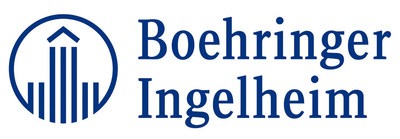- Real-world study shows the effectiveness and safety of second-line Gilotrif® (afatinib) tablets following first-line immunotherapy plus chemotherapy in the treatment of squamous cell carcinoma of the lung - Separate data presented indicate afatinib activity in TKI-naïve patients with G719X/L861Q/S768I non-resistant EGFR mutation-positive NSCLC [13-October-2020]
|
RIDGEFIELD, Conn., Oct. 13, 2020 /PRNewswire/ --Boehringer Ingelheim today announced new data for Gilotrif® (afatinib) which further affirm its activity in squamous cell carcinoma of the lung and, in a separate study, epidermal growth factor receptor mutation-positive (EGFR M+) non-small cell lung cancer (NSCLC). The findings are being presented at the IASLC 2020 North America Conference on Lung Cancer hosted by the International Association for the Study of Lung Cancer (NACLC 2020). Analysis from a retrospective, real-world study of patients with metastatic squamous NSCLC who progressed on first-line pembrolizumab plus platinum-based chemotherapy provides effectiveness and safety data for afatinib following immunotherapy (IO) in this second-line setting. Median overall time on treatment (TOT) for patients who received second-line afatinib was 7.3 months (95% confidence interval [CI]; 5.2-8.1). Incidence of severe immune-related adverse events (irAEs) occurred in six patients (pneumonitis, colitis, hepatitis). This analysis also evaluated chemotherapy in this second-line setting, with median overall TOT of 4.2 months (95% CI; 3.9-4.9). There were no reported irAES in the chemotherapy cohort. "Given relatively recent advances with immunotherapy, prospective trials have yet to investigate the use of afatinib following first-line immunotherapy and chemotherapy in metastatic squamous non-small cell lung cancer," said Edward S. Kim, M.D., FACP, Levine Cancer Institute. "Findings from this study suggest that second-line afatinib is generally well-tolerated and effective in patients with metastatic squamous cell carcinoma of the lung when pembrolizumab is added to first-line platinum-based chemotherapy." In a separate data set presented at the meeting, researchers assessed the use of afatinib in Asian and non-Asian patients with EGFRm+ NSCLC whose tumors have G719X/L861Q/S768I non-resistant mutations, pooled from randomized clinical trials and real-world studies. The analysis showed that afatinib is effective in these patients, and is unaffected by ethnicity (overall response rate: 66% Asian/59% non-Asian; median duration of response: 14.7 months/15.9 months; G719X: 62%/65%; L861Q: 60%/50%; S768I: 80%/25%). Bjoern Rueter, M.D., Therapeutic Area Head Oncology, USA, at Boehringer Ingelheim, said, "These data sets further expand our understanding of afatinib's therapeutic profile in metastatic squamous non-small cell lung cancer and among those with EGFR mutation-positive disease. As we continue to take cancer on at Boehringer Ingelheim, our ongoing research is aimed at supporting unmet treatment needs for the lung cancer and broader oncology community through leading science." Gilotrif is indicated for the first-line treatment of patients with metastatic NSCLC whose tumors have non-resistant EGFR mutations as detected by an FDA-approved test. Gilotrif is also approved for the treatment of patients with advanced squamous cell carcinoma of the lung whose disease has progressed after treatment with platinum-based chemotherapy. Data Presentations Featured at IASLC NACLC 2020:
What Is Gilotrif?
It is not known if Gilotrif is safe and effective in treating people with lung cancer that has resistant abnormal EGFR genes. or is used to treat people with squamous cell lung cancer that:
It is not known if Gilotrif is safe and effective in children. Important Safety Information for Gilotrif® (afatinib) Tablets Before you take Gilotrif, tell your doctor if you:
Tell your doctor about all the medicines you take, including prescription and over-the-counter medicines, vitamins, and herbal supplements. Gilotrif may affect the way other medicines work, and other medicines may affect the way Gilotrif works. Taking certain medicines with Gilotrif may increase your risk of developing a tear (perforation) in your stomach or intestine. What to avoid while taking Gilotrif Gilotrif may cause serious side effects, including:
Your doctor will do blood tests to check your liver function during your treatment with Gilotrif.
Your doctor may change your dose, temporarily stop or permanently stop treatment with Gilotrif if you have certain side effects. The most common side effects of Gilotrif include diarrhea, rash, acne, mouth sores, nail inflammation, dry skin, decreased appetite, nausea, vomiting, and itching. Gilotrif may cause decreased fertility in females and males. This may affect your ability to have a child. Talk to your doctor if this is a concern for you. Tell your doctor if you have any side effect that bothers you or that does not go away. These are not all of the possible side effects of Gilotrif. For more information, ask your doctor or pharmacist. Call your doctor for medical advice about side effects. You are encouraged to report negative side effects of prescription drugs to the FDA. Visit www.fda.gov/medwatch or call 1-800-FDA-1088. Please see Prescribing Information and Patient Information. GF CONS ISI 10.21.19 About Boehringer Ingelheim in Oncology About Boehringer Ingelheim As a world-leading, research-driven pharmaceutical company, more than 51,000 employees create value through innovation daily for our three business areas: Human Pharma, Animal Health, and Biopharmaceutical Contract Manufacturing. In 2019, Boehringer Ingelheim achieved net sales of around $21.3 billion (19 billion euros). Our significant investment of over $3.9 billion (3.5 billion euros) in R&D drives innovation, enabling the next generation of medicines that save lives and improve quality of life. We realize more scientific opportunities by embracing the power of partnership and diversity of experts across the life-science community. By working together, we accelerate the delivery of the next medical breakthrough that will transform the lives of patients now, and in generations to come. Boehringer Ingelheim Pharmaceuticals, Inc., based in Ridgefield, CT, is the largest U.S. subsidiary of Boehringer Ingelheim Corporation and is part of the Boehringer Ingelheim group of companies. In addition, there are Boehringer Ingelheim Animal Health in Duluth, GA and Boehringer Ingelheim Fremont, Inc. in Fremont, CA. Boehringer Ingelheim is committed to improving lives and strengthening our communities. Please visit www.boehringer-ingelheim.us/csr to learn more about Corporate Social Responsibility initiatives. For more information, please visit www.boehringer-ingelheim.us, or follow us on Twitter @BoehringerUS. MPR-US-101420 Boehringer Ingelheim Pharmaceuticals, Inc.
SOURCE Boehringer Ingelheim Pharmaceuticals, Inc. |





